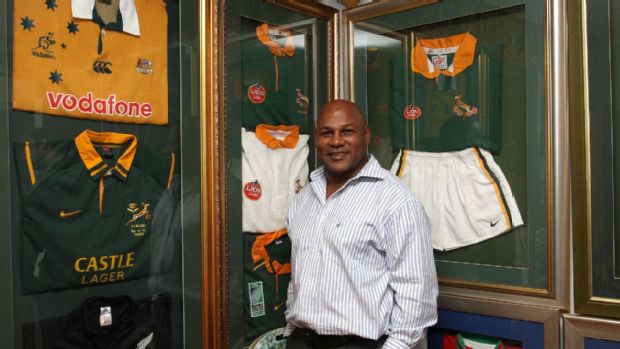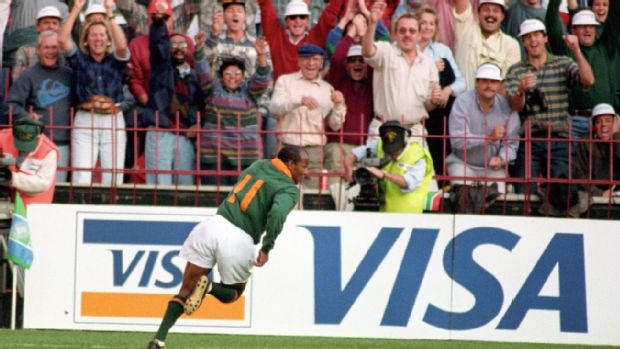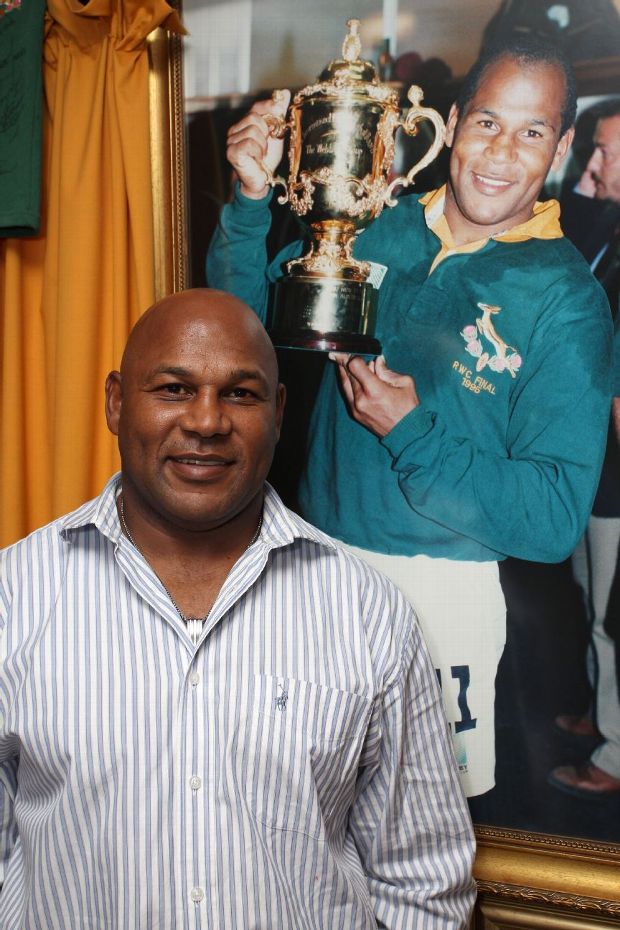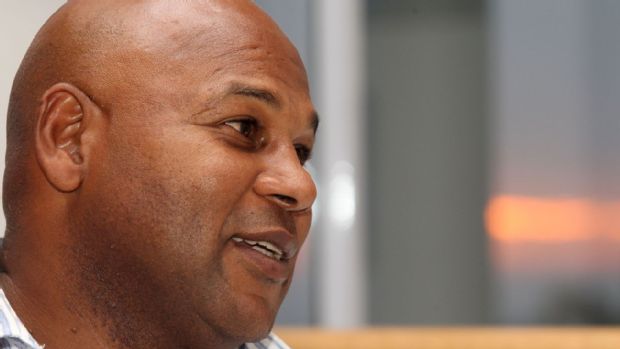|
Rugby World Cup
Chester Williams on his 'almost impossible dream' to become a Springbok
Tom Hamilton
September 25, 2015
< Samoa hope to pile on misery for Sprinkboks
Chester Williams' wife halts our conversation with the offer of a drink. "Not quite yet my love," is his answer. The pause allows a change of scenery. He offers the chance to see the haul of memorabilia from his playing career. Passing some antelope heads on the wall, the stairs dip and then rise again to a room full of framed jerseys. It is a rugby anorak's paradise. Shirts from around the world are framed on the wall, every reminder from his career are showcased in this room. "That's Jonah's, that's Joe Roff's. Campese's is somewhere..." Then he points to a framed blazer on the wall. "My World Cup-winner's shirt is with my father but I have kept the gold medal and the Mandela Medal ... that's what I am most proud of." His playing career saw him emerge as the face of the 1995 Rugby World Cup. His coaching career took in stints in South Africa, Uganda, Tunisia and Romania. But now as we sit in his beautiful house in Plattekloof looking out on to the vast plane of Cape Town underneath us, his memory drifts back to what it was like playing the sport he loved in apartheid South Africa. The mist has now covered the stunning panoramic view from his patio windows but Table Mountain peeks through at the back. "I never thought I'd have the lifestyle I have now ... It was difficult times when I was growing up," Williams tells ESPN. "I was trying to idolise my dad as he was playing for the black team who were one of the few who were playing against the white people." His father Wilfred faced the British Lions in 1974 for the Federation -- a team who broke away from the South African Coloured Rugby Football Board to play in inter-race matches - and showed unrivalled versatility as he slotted in at fullback, centre and flanker throughout his playing career. "I also dreamt of being a Springbok even though in those days it was almost impossible to become one. I kept on dreaming and through hard work, persistence, I got the opportunity to play once and I had to keep my position through hard work and determination. I never really had the talent as they say, but I had potential to achieve.  Chester Williams poses in front of memorabilia from his playing career© Shaun Roy/Gallo Images for ESPN "I remember getting the bus to the fields and playing against the white players so we then had to get changed on the bus as the changing rooms were only for white players. The after-game functions were just for white people. "It was difficult times but I wanted to be recognised for the ability I thought I had. I trained hard, work hard and travelled by train every morning at four in the morning and got back at 11 in the night and that was five or six days a week. Rugby was amateur then but I was putting so much into it. But then things worked out for me when the game became professional. I had to work hard to try to be a great Springbok and being part of that team in 1995, I achieved it." The story of the 1995 World Cup is already well versed. Williams was forced to pull out of the squad on the eve of the tournament due to a hamstring injury. His World Cup hopes were pinned on a team-mate picking up an injury or suspension. The folly of the rugby administration at the time meant that Williams was actually present in Newlands for the opening game as he was an employee of the Western Province but his role was restricted to being a water boy -- for the Springboks opponents, Australia. After seeing off Australia and Romania came their final pool match against Canada. It was an ill-tempered affair which resulted in three red cards but then came the tournament-ending bans for Pieter Hendricks and James Dalton. With Hendricks in absentia, Williams received his call-up and on his 12th cap for South Africa, and first appearance in the World Cup, he scored four tries against Samoa in the quarter-final. He went on to play in their semi-final win over France and in the victorious finale against the All Blacks. Williams was literally the face of the tournament. As you left Johannesburg airport, his was the first face you saw on a huge billboard. In a country fresh from the ills of apartheid, presenting a racially accepting façade to the rest of the world was key. The image of unity between Nelson Mandela and Francois Pienaar in the final was the perfect manifestation of the new 'Rainbow Nation'.  Chester Williams runs in a try© Picture by: Tony Marshall / EMPICS Sport But it was an image and view that sat uneasily with Williams. He was the all-court hero but a reluctant one. In 2002 he published his autobiography, 'Chester'. In it, he lifted the lid on his own frustrations, spoke of a racist verbal volley from James Small and attacked the way his race was manipulated in the tournament. The image of a multi-racial Springboks team, pinned around him, was a sham. "The marketing men branded me a product of development and a sign of change," Williams said in 2002 interview. "Nothing could have been more of a lie. I wasn't a pioneer. Other black players had been Springboks before me, one of them in my own family [his uncle Avril was capped in 1984]. More have followed me. They know the vibe. They have felt it and been demoralised by it." Now? He has mellowed a touch but you sense the manipulation and exploitation of his image still sits uneasily. "Look, I enjoyed 1995, but I knew I was under massive pressure. There was a lot of pressure on me to be successful. The billboards were of me, everywhere. And then I got injured - Chester wasn't there to play anymore. And then I got called back and the pressure was even greater as I went straight into the quarter-finals. If we lost, I'd have got blamed. But then I got my four tries..."  Chester Williams poses in front of his picture© Shaun Roy/Gallo Images for ESPN Twenty years on and the current state of South African rugby sits a little uneasily with him. His last official role with the team was as South Africa's Sevens coach. He was long mooted as a potential Springboks coach and in 2007 he thought he'd get the job ahead of Jake White. It didn't come to pass. He is still an avid watcher of the sport. Rugby is his lifeblood and he'd love to "just be part of the system". Such is the unique nature of South African sport, rarely do rugby and politics live in isolation. Even through the regular din of a Rugby World Cup, the drum of transformation and the Springboks is continuing to sound. It is still a sensitive subject and Williams will be keeping a close eye on Heyneke Meyer's selections. "A lot of guys have given a chance to Springboks but if you look at those circumstances, they are picked but then left out. They aren't given sufficient opportunities. I refer to them as opportunities instead of calling them development players because theoretically Bryan Habana is still a quota player but he has over 100 caps -- he isn't one. That's my biggest concern as I don't think the players are getting a chance, the opportunity. Look at Oupa Mohoje -- he was our No.1 flanker but suddenly they don't talk about him anymore. "You must scrap quotas but I still think there must be opportunities for the black players. You must give them more than one chance -- they need to show confidence. If they have [only] a good camp, they drop them. If they have an excellent camp, they keep them. They must have an excellent Test but not everybody can perform on their debut. There are guys who haven't been given sufficient opportunities and that's my biggest concern with transformation. "It's like apartheid; we've been having it for so many years it's difficult to get over it. The end goal is that no one speaks about transformation. You don't even talk about it and people accept the team for what it is. If we look at numbers, we won't get past the transformation."  Chester Williams speaks to ESPN at his home© Shaun Roy/Gallo Images for ESPN On June 24, 2015, the remaining members of the World Cup-winning vintage of 1995 met at Ellis Park to celebrate the 20-year anniversary of that momentous day. "We all looked different, but our personalities haven't changed," says Williams. And despite his re-adjusted perspective on the day and his role in the triumph, it is the memory that perhaps holds greater credence than all of the remarkable memorabilia in his house. "It showed what we can achieve -- if we stand together, are a powerful nation. Sport is powerful which is why the World Cups in the various sports are so important. That brings memories, brings people together, helps them communicate and build new-found respect." His step-son Ryan was seven when he was in his pomp as a player. The twins Chloe and Matthew he had with his second wife Maria are now 10; they will know little more of his playing days than the room of memorabilia and the videos. One day he will tell them the story of everything he achieved; it will occur on a train. "When we travelled by train during the apartheid years, it was a third-class carriage and we had to stand for two hours to work as it was that packed," Williams tells ESPN. "The other day I said to my wife I can't remember the last time I was on a train, it was a long, long time ago. I'd like to put my kids on the train and tell them the story of me." © ESPN Sports Media Ltd. Tom Hamilton is the Associate Editor of ESPNscrum.
|
Live Sports
Communication error please reload the page.
-
Football
-
Cricket
-
Rugby
-
- Days
- Hrs
- Mins
- Secs
F1 - Abu Dhabi GP
Abu Dhabi Grand Prix December 11-131. Max Verstappen ()
2. Valtteri Bottas (Mercedes)
3. Lewis Hamilton (Mercedes)
4. Alexander Albon ()
5. Lando Norris ()
6. Carlos Sainz Jr ()
-
ESPNOtherLive >>
Golf - Houston Open
Snooker - China Open
Tennis - Miami Open

